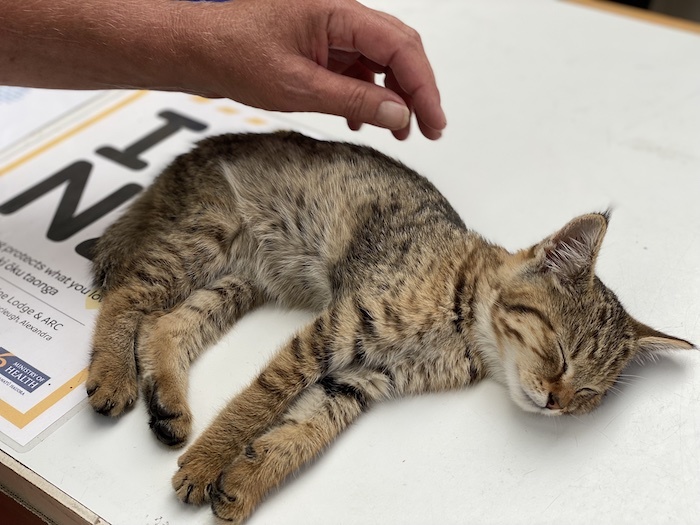Wild kitten problem growing in Central Otago
Anna Robb
25 February 2022, 5:03 PM
 Shirlene Steel, founder of ARC and Hannah with Hissy a kitten, that has malnutrition and infected eyes.
Shirlene Steel, founder of ARC and Hannah with Hissy a kitten, that has malnutrition and infected eyes. Wild kittens appear cute, but this year they are especially feral causing local animal rescue charity Animal Rehab Central to call for more education and support.
Animal Rehab Central (ARC) founder Shirlene Steel, who also owns Pet Pit Stop in Alexandra’s Centrepoint Mall, has some advice for people who discover any wild cats following reports that numbers were particularly high this year.
“Don’t feed any wild cats you might find, as this can cause them to breed and then it becomes someone else’s problem."
Since the SPCA restructured its operations in Central Otago back in 2019 Shirlene is frequently being approached by people for assistance.
Currently, Shirlene has 15 kittens in her care, five others fostered to temporary homes and she has had calls from three Central Otago residents with wild cats or kittens that they don’t want around anymore.
"In the past week or so three people have called me, and each of those properties has wild kitten numbers in the double digits and they want them gone.
"This year it's not normal and these cats can't be handled, they are as wild as wild."
Once the wild cats are rescued they need to be isolated, treated for things like conjunctivitis, cat flu and worms.
Then they need to receive their first vaccination before they can be adopted.
It can take around six weeks from the time they are rescued until they are healthy enough to go to new homes.
"Its a double edged sword, cat people can't not feed these cats, and then the other half of the population loathe wild cats and the damage that they do to the environment.
"We wouldn't feed possums, so don't feed cats."
SPCA area manager Sophie McSkimming said the SPCA was unable to assist with feral or wild cats, as they were not covered by the Welfare Act as they are considered pests.
"Because they’ve never had any human interaction, they can’t be handled by people and therefore can’t be treated or rehomed by us.
"The Department of Conservation has some ability to control feral cat populations on conservation land and local councils can assist with problems relating to feral cat populations.
"Stray cats, however, fall under SPCA and we do lots of work in this space.
"Stray cat populations are a complex issue that we’re determined to continue to work to address through desexing," she said.
"Stray cats often will keep coming back to an area if they find a food source (whether this is through rubbish scraps or someone feeding them, for example), so if people are looking for ways to deter stray cat populations, they should consider removing any attractants."
Shirlene said she was not asking the SPCA to take them on, but that someone has to deal with them and her fledging charity does not have the funds to resolve the issue.
The Department of Conservation (DOC) has a legislated mandate to control feral cats on public conservation land.
The techniques that DOC currently use to control feral cats are poisoning, trapping and shooting.
Where cats are lethally controlled, DOC uses efficient and humane best-practice techniques and adheres to the Animal Welfare Act 1999.
When asked about how to get help with feral cats, the Central Otago District Council points callers to DOC who can issue traps and give advice to those dealing with a feral cat problem.

Meet Hissy, a rescued kitten from the Crown Range a few days ago, she'll need a new home in around six weeks. PHOTO: Anna Robb
ARC is a newly established charity which aims to provide care and rehabilitation for the regions animals in need. For more visit: Animal Rehab Central.
If you do want to support ARC, or foster or adopt a kitten please get in touch with ARC via email: [email protected]


